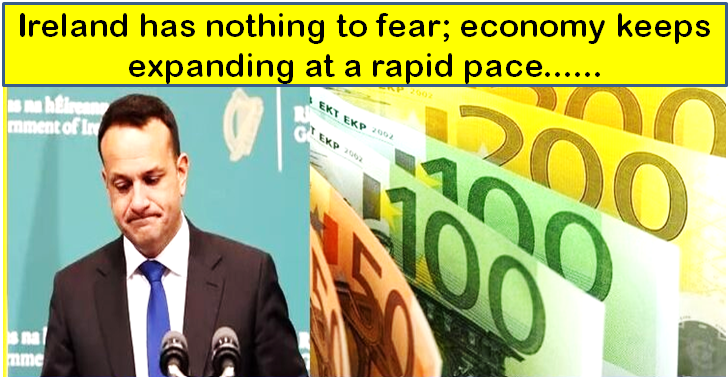Dublin: The Irish economy continues to expand at a rapid pace, revealing that Ireland is experiencing remarkable growth despite COVID-19 and European zone inflation.
Figures indicate that growth in the financial sector is at a record pace. Ireland has regained its position as the country with the highest per capita income in the world.
Corporation tax revenues are at an all-time high. That is the main reason for the expected surplus. Despite a large increase in spending due to cost-of-living measures, the general economy is expected to generate a surplus of 10 billion euros this year and will continue to do so in the coming years, according to the finance minister. The government anticipates a 16 billion-euro surplus next year.
Prime Minister Leo Varadkar is predicting that Ireland will become a country with a surplus of €65 billion by 2025.
The Prime Minister said that using the surplus generated in the financial sector, the main objectives are to reduce public debt, increase some capital expenditure, and establish new reserve capital funds.
It does not mean that economic growth will last forever. In times of crisis, it is best to anticipate problems and plan safely for Ireland’s future. It will inevitably happen.’ Leo Varadkar stated this to the media.
Despite last year’s crisis, Varadkar said Ireland was proud to have welcomed more than 100,000 people from all over the world. The majority of them are from Ukraine, he said, adding that housing shortages have hurt tourism in some parts of the country.
The government will have to fight hard to solve the housing crisis, but the Prime Minister stated that the government is doing everything possible now—renovating old buildings, building modular houses—and that the government has begun.
Finance Minister Michael McGrath said that the current government is taking an opportunity to secure the country’s financial sector by holding a surplus through public finance. This is an opportunity that comes only once in a lifetime. He said.
Targeted spending on housing is one of the most important options, but funding has not been a real barrier in previous years. Minister McGrath stated that there is a problem with delivery, workers, construction materials, and so on, but that it will be resolved and that progress will be made.
The finance minister presented a paper to the cabinet meeting yesterday outlining options for managing the massive surplus expected in the public finances in the coming years.
The main source of this “fortune” for Ireland is corporation taxes, which this year will amount to €24 billion. Last year, just ten US multinationals together paid 57% of corporation tax.
The main goal of the government is to establish a new national fund distinct from the existing National Reserve Fund, which has invested €6 billion in low-risk government bonds.
Ireland’s approach will be to pursue a diversified investment strategy aimed at generating long-term returns, based on the model of similar funds established in other countries such as Norway, Australia, and Japan.
Minister McGrath says Ireland’s priority is that the government is preparing to launch a number of new projects to meet the costs of a growing population.
His department estimates that the country’s ageing-related costs will be €7-8 billion higher per year by 2030 than they were at the start of the decade.
However, the government is giving a strong signal that Ireland has nothing to fear financially in the next few years.
Growth and immigration
Despite Ireland’s growth, a group of immigrants who have been suffering are the economic migrants who came here in search of work. As the elections approach, it appears that the government is attempting to pay more attention to them. For example, the decision to reconsider the requirement of QQI level 5 for healthcare assistants with higher educational qualifications coming from countries including India was surprising. More than 600 people raised the issue at the government level through members of Parliament through a silent campaign led by ‘Irish Malayali News’ (Irish Samachar). Immediately after the arrival of trade unions and other organisations, it is certain that the issue will be resolved.
The Migrant Rights Centre and representatives from the organisation Overseas Health and Home Care in Ireland began discussions with the Department of Enterprise a month ago to resolve ambiguities regarding the general work permit and family reunification issues. One of the hardest-hit groups in Ireland at present is the general work permit holder from overseas. Neil Richmond, Minister of State for the Department of Enterprises, told Irish Malayali News that the government’s first priority will be to plan for their welfare. The government assures that we can expect an immediate solution to the efforts for that.
Irish Samachar English News
Kindly click the link below to join WhatsApp group chat to get important news and breaking news from Irish Samachar.


Comments are closed.